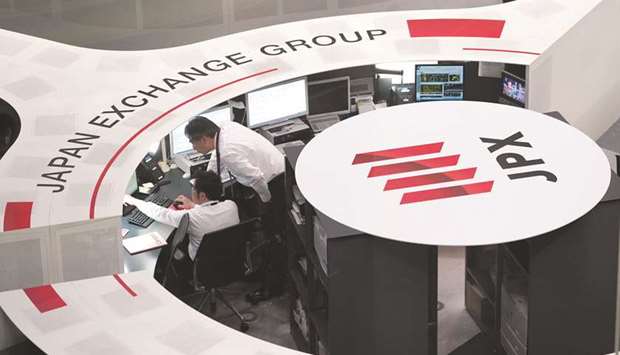Fears over the new coronavirus rattled investors in Asia yesterday as they struggled to work out if the China epidemic was worse than being reported by authorities.
A dramatic rise in the number of deaths and new cases of the virus on Thursday fuelled global suspicions that Beijing was concealing the true scale of the illness. Concern turned to confusion on Friday, however, as the death toll was lowered to 1,380 after authorities said they had double-counted some fatalities.
The uncertainty came as Vietnam quarantined more than 10,000 people in a cluster of villages after six virus cases were detected and Japan reported its first death.
“There are still some lingering concerns hanging like a cloud over the market that we could still get a surprise secondary transmission cluster,” said Stephen Innes at AxiCorp.
“But the intensity and market de-risking is nowhere near the feverish pitches of last Friday.”
Tokyo’s benchmark Nikkei 225 index closed down 0.59% amid concerns over the economic impact from the virus.
Nissan dived 9.64% after the crisis-hit carmaker revised down its full-year sales and profit forecasts, warning that the impact from the epidemic was not yet included in their figures.
After dipping at the open, Shanghai ended the day up 0.38%. Hong Kong fell 0.11% at the open before recovering as investors weighed up the possibility that Thursday’s sharp increase — triggered by a change in the way Chinese officials count new infections — was a one-off.
Elsewhere, Sydney put on 0.38%, Seoul added 0.48% and Taipei gained 0.20%. The surge in virus numbers sent Wall Street into the red on Thursday — a reversal from the previous day when the three main indexes closed at record highs.
The World Health Organisation, which has praised China for its transparent handling of the outbreak, moved to calm fears over Thursday’s jump in deaths and cases.
It said the new numbers did “not represent a significant change in the trajectory of the outbreak.” There is still, however, scepticism among the global public, with suggestions that Beijing may be concealing the extent of the virus the way it did during the 2002-2003 Sars epidemic.
Senior White House official Larry Kudlow said Thursday that the US was “a little disappointed in the lack of transparency” from China, which he said had refused American help.
Under criticism at home over the handling of the crisis, China’s top leadership on Wednesday called for efforts to minimise the impact of the outbreak and pledged measures to help firms deal with the economic fallout.
A day later, the ruling Communist Party fired two top-ranking officials in Hubei.
The revised virus figures have played into investor fears that “it is going to take longer than just a few weeks before business can return to anything like normal in China, including international travel bans for Chinese nationals imposed by various countries,” said Ray Attrill of National Australia Bank.
A UN agency has warned the virus could mean a $4-5bn drop in worldwide airline revenue after 70 carriers cancelled all international flights in and out of China and 50 others reduced their operations.
China is the world’s biggest importer and consumer of oil, and crude prices have been particularly sensitive to the epidemic.
Global oil demand will suffer its first quarterly drop in a decade as the virus lashes China’s economy and its impact ripples throughout the world, the International Energy Agency said Thursday.
The main contracts reacted mildly to the news.
Brent Crude was up 0.0% and West Texas Intermediate was 0.14% higher.
In Shanghai, the Composite index closed up 0.38% to 2,917.01 points; Hong Kong — Hang Seng ended up 0.31% to 27,815.58 points and Tokyo — Nikkei 225 closed down 0.59% to 23,687.59 points yesterday.

Employees work at the Tokyo Stock Exchange. The Nikkei 225 closed down 0.59% to 23,687.59 points yesterday.
